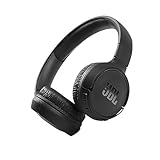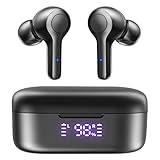There is no doubting that loud, upbeat music can make you feel good from your head to your toes, but your eardrums may not agree with your preference for loud music.
While research shows that listening to overly loud music for prolonged periods can do damage to your hearing, this doesn't mean we need to be assigned to a life of wearing quiet headphones.
But exactly how loud is too loud when it comes to using headphones? Let's look at some tips to choosing the right headphones that not only deliver high-quality sound for your music enjoyment but do so without damaging your hearing.
Does Loud Music Impair Hearing?
Unfortunately, we are all aware that people working in a very loud environment have experienced hearing damage and loss. This is why the government brought in many health and safety regulations for industries where workers are exposed to high noise levels.
The use of earplugs and ear defenders are compulsory pieces of safety equipment for industries such as manufacturing and aviation, but what about those working in the music industry? Don't they have the same risk levels when working with music all day?
Whether you are a professional musician, a singer in a rock band or even a conductor of a live orchestra, your ear canal will be exposed to loud music all of the time; therefore the risks to your hearing are much higher. However, it would be impossible to wear ear defenders at work because it would hinder your ability to do your job!
Related: How to Turn Off Headphone Safety? Step-By-Step Guide
What About Wearing Headphones?
The difference between you as a headphone-wearing music lover and an industrial worker is that they will have protective equipment, whereas your hearing will be exposed directly to loud music coming through your headphones.
Listening to loud music can impact on your hearing in two different ways. Firstly, through exposure to high volume, and secondly, through the prolonged duration.
For humans, any loud noise over 85 to 90 decibels (dB) is bad for your hearing. However, the damage you can do to your ear canal will be made much worse if you choose to listen to loud music for hours on end.

A good rule of thumb is to work by is: The louder the volume, the shorter the duration. Many experts suggest that you should listen to loud music for no more than 1 hour per day at no more than 60% of the device's maximum volume.
This is commonly referred to as the 60/60 rule. There is a myth that Bluetooth headphones are less damaging than their on-ear counterparts, but there is no scientific evidence to prove the claim.
Irrespective of the medium of transmission, the sound volume need to traverse through your ear canal
Choosing The Loudest Headphones
While it can be hugely frustrating to buy new headphones only to find they are really quiet, no matter how much you crank up the volume on your music device, sometimes you don't necessarily need to buy 'loud headphones' to enjoy your music.
A lot of thought and planning has gone into engineering headphones that are not necessarily designed to be loud with a high output of volume, but instead act to cancel out outside noise to enable you to hear music through your headphones better.
By far the best and loudest sounding headphones come in the form of flexible in-ear monitors (IEMs) that are made of a soft, pliable material that can mould to fit your ear giving you a comfortable fit and feel. IEMs will ultimately provide you with the best sound quality; however, they are usually the most expensive type to buy.
When you combine outside noise reduction/elimination with better headphone engineering, you can experience your favourite music entirely, even in noisy built-up areas, without putting your hearing at risk by exposing it to high-frequency range & volumes.
Protecting Children And Teenagers
Headphone wearing is particularly popular among children and teenagers, but it is well known that exposure to loud volumes at an early age can result in hearing loss among children and teens, meaning they will go into adulthood with impaired levels of hearing that will last them a lifetime.
This is why it is so important to make sure that parents and family members choose to buy gifts of headphones for children and teens with great care and forethought.
It is wise not to go for the cheapest option when buying headphones for youngsters in the belief that they will probably end up breaking them.
It is incredible to think that there are headphones on the market that can produce volumes up to 120 decibels - the equivalent sound quality of being at a live rock concert!
If you are buying a pair of headphones for your children and are worried that they will ignore your warnings over volume levels, then there are Android and iOS apps to help limit their volume. Look at Volume Limiter on Android or Volume Sanity on iOS.

Features To Consider When Buying Loud Headphones
When buying a new set of headphones, especially for children and teenagers, consider their noise cancellation capabilities. A good noise-cancelling set of headphones will create a comfortable seal inside the ears so that you can enjoy in music without any distracting outside noise seeping in.
Check the decibel level of the product and read up on the headphone manufacturer's website about what research and design have gone into their product.
Noise cancellation is an essential part of making any headphones seem louder, even though they may not be the loudest model on the market.
Having noise cancellation technology means that when in use they will cancel out surrounding noise from your immediate environment so you can really hear and enjoy a clean and crisp sound coming through your headphones.
Conclusion
While buying a set of high-quality headphones with cutting-edge noise cancellation technology may cost you more than buying a cheap set of 'loud headphones', the cost to your hearing will be much less expensive in the long-run.
If you want to continue to listen to loud music, but also care about your hearing, then go for quality noise-cancelling headphones over cheaper options and limit your exposure to the recommended 60/60 rule. This applies to both on-ear headphones and over-the-ear models
We hope reading this has made you stop to think about the health of your hearing before going out to buy a new set of headphones and accessories. The recommendations made here are definitely worth bearing in mind!







